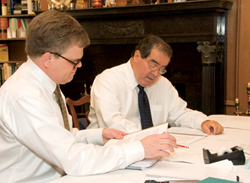A Quote by Dorothy L. Sayers
A passage is not plain English - still less is it good English - if we are obliged to read it twice to find out what it means.
Related Quotes
A word about 'plain English.' The phrase certainly shouldn't connote drab and dreary language. Actually, plain English is typically quite interesting to read. It's robust and direct-the opposite of gaudy, pretentious language. You achieve plain English when you use the simplest, most straightforward way of expressing an idea. You can still choose interesting words. But you'll avoid fancy ones that have everyday replacements meaning precisely the same thing.
I don't find English restrictive, but it brings a level of discipline to my writing that I wouldn't have in Bulgarian. My control of English, however you define it, my ability to work in English, is more limited than in Bulgarian. That means out of necessity I have to develop a style that goes for clarity of expression which I may not have done otherwise.
Read a lot. But read as a writer, to see how other writers are doing it. And make your knowledge of literature in English as deep and broad as you can. In workshops, writers are often told to read what is being written now, but if that is all you read, you are limiting yourself. You need to get a good overall sense of English literary history, so you can write out of that knowledge.
In the 19th century, the English were loathed. Every memoir that you read of that period, indicates the loathing that everybody felt for the English, the only difference between the English and Americans, in this respect, is the English rather liked being loathed and the Americans apparently dislike it intensely.
Not long time ago there was a striking example of the extent to which English has diverged: a television company put out a programme filmed in the English city of Newcastle, where the local variety of English is famously divergent and difficult, and the televised version was accompanied by English subtitles!
We do not for example say that the person has a perfect knowledge of some language L similar to English but still different from it. What we say is that the child or foreigner has a 'partial knowledge of English' or is 'on his or her way' towards acquiring knowledge of English, and if they reach this goal, they will then know English.
The fact that for a long time Cubism has not been understood and that even today there are people who cannot see anything in it means nothing. I do not read English, an English book is a blank book to me. This does not mean that the English language does not exist. Why should I blame anyone but myself if I cannot understand what I know nothing about?" -Pablo Picasso.



































